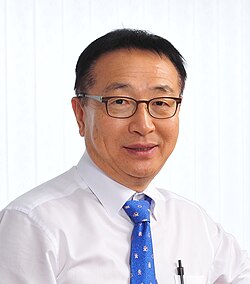Keynote Speaker
Professor Girish N. Nair
The University of Melbourne

Autonomous Navigation and Localisation: A Tale of Two Viewpoints
Abstract
We discuss two almost diametrically opposite stochastic perspectives on autonomous navigation and localisation: one discrete, and the other continuous and infinite-dimensional. In the first approach, we model the autonomous agent as a discrete-valued, partially observed Markov decision process, and augment it with entropy-based measures of trajectory uncertainty and complexity. These measures capture the minimum internal cost, in bits, of storing/communicating state trajectory beliefs and sensor observation sequences. In robotics, whole-of-trajectory entropies have previously been dismissed as intractable to optimise due to the nonlinear joint entropy functional acting on the entire trajectory. We show that, surprisingly, these entropies can be put into convenient stage-additive forms that enable optimisation using standard techniques, leading to principled trade-offs between exploitation and exploration. In simulations, trajectories reminiscent of the motion of some animals are produced.
In the second approach, we model the agent dynamics as a continuous-valued stochastic process with infinite-dimensional, noisy measurements. This is motivated by systems with low-dimensional dynamics but high-dimensional sensors, for instance autonomous vehicles equipped with vision or LiDAR. For linear systems, we explicitly derive the optimal linear filter in the sense of the minimum mean square error, analogous to the classic Kalman filter. We then propose an extension of this approach to handle nonlinearities, leading to an EKF-like approach with infinite-dimensional measurements. This extension provides a novel system-theoretic justification for the use of imagegradients in vision-based estimation. We demonstrate the practical utility of this filter on a real-world aerial drone dataset, showing significantly improved performance compared to an established visual odometry technique.
This is based on recent work with Dr Timothy L. Molloy (ANU) and Maxwell M. Varley:
https://doi.org/10.1109/TAC.2023.3250159
https://doi.org/10.1109/TAC.2023.3264177
https://doi.org/10.1109/TAC.2024.3464892
Biography
Girish N. Nair is a Professor in the Department of Electrical and Electronic Engineering at The University of Melbourne. He is a Fellow of the IEEE and was an Australian Research Council Future Fellow (2015 - 2019). His research focuses on the interplay between estimation, control and information theory, in both stochastic and nonstochastic settings. He has received several prizes, including the 2014 George S. Axelby Outstanding Paper Award from the IEEE Control Systems Society and a 2006 SIAM Outstanding Paper Prize. From 2019 - 2024 he was the lead Australian investigator for the Australia-US Multidisciplinary University Research Initiative on Neuro-Autonomy. From 2017 - 2022 he served as Deputy Head of Department (Research & Research Training), and from 2022 - 2024 he led the Control & Signal Processing research group in the Department. He is the General Chair of the 67th IEEE Conference on Decision and Control, to be held in Sydney in 2028, and the inaugural Chair of the Victoria/New South Wales Joint Chapter of the IEEE Information Theory Society.
Plenary Speaker
President Jong-Oh Park
Korea Institute of Medical Microrobotics

Commercialization of Medical Microrobotics
Abstract
Microrobotics is surely one of very challenging research issues, and this impression has not changed up to now. It requires advanced technologies in various fields such as actuation, navigation, intelligence, communications, power supply, and even extinction. These high-level technologies result in high manufacturing costs. Consequently, microrobotics seems more suitable for human body-related fields, such as medical and warfare applications, emphasizing the importance of medical microrobotics.
While promising and fundamental technologies like the use of biological protein motors and enzyme functions remain hot topics for discussion, fundamental research will eventually translate into practical products. In this presentation, various commercialization efforts are explored—from applications in the digestive organ and circulatory system to anti-cancer therapy. Before discussing real disease applications, the basics of medical microrobotics are introduced.
Several detailed practical efforts are highlighted. For example, in digestive organs, actively controlled capsule endoscopes are demonstrated, focusing on precise actuation and navigation, as well as 3D reconstruction and autonomous symptom detection. In the circulatory system, diagnostic devices such as catheters—traditionally relying on surgeon skill—have been adapted to remote control systems, including a compact magnetic actuation system. Another development includes transarterial chemical embolization with precise guidance of embolic beads. These commercialization efforts are expected to lead to tangible products and further active research.
Biography
Jong-Oh Park is a renowned South Korean robotics scholar, currently serving as the president of the Korea Institute of Medical Microrobotics (KIMIRo), an organization he established in 2019 to advance medical microrobotics research and commercialization. He received his B.S. in Mechanical Engineering from Yonsei University in Seoul, followed by an M.S. in Mechanical Engineering at KAIST in Daejeon. After earning his master's degree, he completed a Ph.D. at Stuttgart University and worked as a researcher under Hans-Jurgen Warnecke at Fraunhofer-IPA in Stuttgart, Germany, from 1982 to 1987. He was associated with the Korea Institute of Science and Technology (KIST) from 1987 to 2004, serving as the director of the 21C Frontier Project “Intelligent Microsystem Program” for five years. He was a professor at Chonnam National University from 2005 to 2022 and simultaneously led the Robot Research Initiative (RRI). Jong-Oh Park has held prominent roles in the international robotics community, including chairman of the International Federation of Robotics (IFR) in 2006 and an executive board member. He also contributed as Vice Chair of the Organizing Committee for ISR 2013, organizing chair of ICCAS 2013, and editor of IEEE Biorob in 2014. Between 2014 and 2017, he served as vice president of the Institute of Control, Robotics and Systems (ICROS) and is currently the chairman of its BioRobot Research Group. Appointed to the Presidential Committee on the 4th Industrial Revolution and the Healthcare Ad Hoc Committee in 2017, Jong-Oh Park has been a pivotal figure in advancing robotic technologies in medicine and industry.